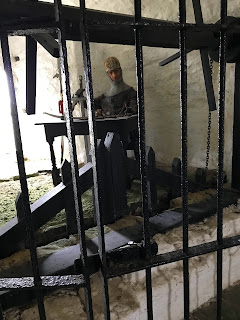I liked teaching about Gerald of Wales, his tall tales—like beavers chewing off their testicles to escape hunters—went down well with most classes I taught, but it must be said, the man was a bit of a stirrer. Last week, we visited his birthplace, Manorbier Castle on the Pembrokeshire coast.
The Great Hall where they feasted on every kind of roast including heron and swan and occasionally dolphin.
Manorbier is fascinating enough. It was granted to a knight who fought for William the Conqueror at Hastings, and Odo de Barri constructed a motte and bailey castle where the present stone castle stands. It was Odo’s son, William who built much of the limestone castle standing today. And in 1146, Gerald of Wales, the fourth and youngest son of William, was born there. It may be relevant that he was related on his mother’s side to Nest ferch Rhys, the daughter of Rhys ap Tewdwr, the last king of Deheubarth, south Wales. The Normans were quite savvy when it came to marriage. It may also explain Gerald’s obsessive ambition later in life.
Gerald studied in Paris, was employed in various ecclesiastic missions in Wales, and showed his ‘sneaky’ side when reporting the Archdeacon of Brecon for having a mistress. The old Archdeacon was sacked, and Gerald took his place. For him, Brecon was a stepping stone. He had his eyes on a bigger prize, the bishopric of St David’s held by his uncle. When his uncle died, the Chapter unanimously chose Gerald as his successor, but Henry II wasn’t having it. Henry knew well enough that St David’s wanted independence from Canterbury, and after having just got rid of one troublesome cleric—Thomas Becket— was wary of another.
According to Gerald, the king remarked that:
“It is neither necessary or expedient for king or archbishop that a man of great honesty or vigour should become Bishop of St David’s for fear that the crown and Canterbury should suffer thereby. Such an appointment would only give strength to the Welsh and increase their pride.”
One suspects that Gerald put some of these words into the royal mouth. In 1184 Henry sweetened the disappointment by appointing Gerald as Royal Chaplain where he mediated between the crown and Prince Rhys ap Gruffydd, and the following year, accompanied Henry’s son, John, to Ireland. There Gerald wrote Topographia Hibernica, followed a few years later by an account of Henry’s conquest of Ireland. Though admiring Irish music, Gerald reflects the prevailing Anglo-Norman view that the Irish themselves were little more than savages.
In 1188, he began a comprehensive tour of a densely wooded Wales accompanying Baldwin, the archbishop of Canterbury, on a great recruitment campaign for the Third Crusade. It was there he wrote his two greatest, certainly the most well-known of his works: Itenerarium Cambriae 1191and Descriptio Cambriae 1194. Despite a credulous acceptance of Welsh superstitions and legends like poltergeists, hauntings, and self-castrating beavers, the two works give a wonderful insight into C12th Wales and bring history to life in the classroom.
In 1198, Gerald had a second chance of being appointed Bishop of St David’s. The local chapter again chose him as their new bishop; King John was also favourably inclined, but Hubert Walter Archbishop of Canterbury wasn’t. For the next four years the Pope was hounded alternately by a desperate Gerald and agents of the archbishop. Again, Gerald lost out.
As I said, Gerald was a bit of a stirrer and had no trouble getting leading Welsh princes on side; he was accused of fermenting rebellion against English rule and fled to Rome, where the Pope, fed up with the whole business, appointed a tiebreaker as the new Bishop of St David’s.
Gerald protested vehemently saying that it was because he was Welsh, he was being denied the job and never forgave King John, siding with the French when Louis VIII was invited by rebellious barons to seize the English throne. He died at Hereford aged 77. Denied the bishopric of St David’s, his body may or may not be buried there. His dummy resides in Manorbier castle.











